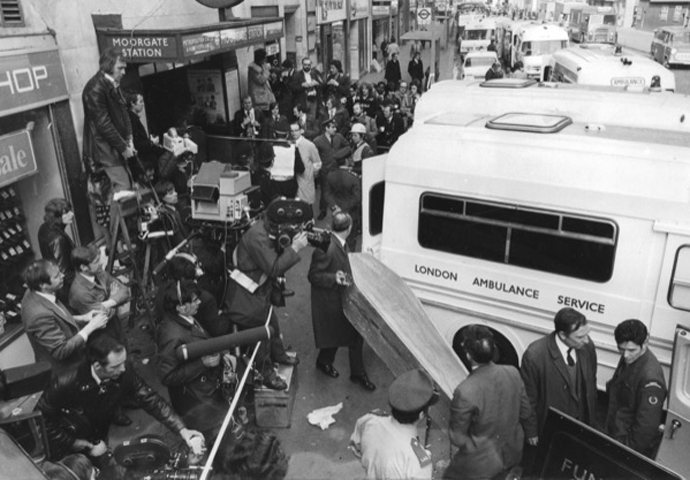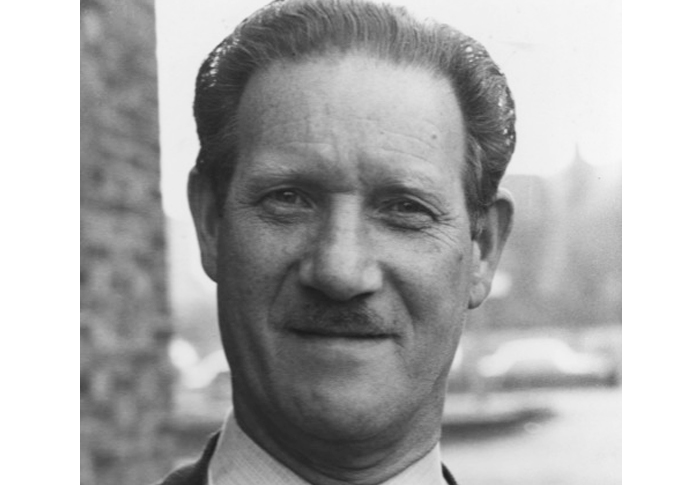The train disaster that robbed TV comedy writer of his father
Peter Gruner talks to Laurence Marks, whose father died in the Moorgate crash in 1975, the subject of a two-part BBC radio drama
Thursday, 17th April 2025 — By Peter Gruner

Laurence Marks, right, and Maurice Gran
IT happened 50 years ago but few who were alive then can ever forget the nightmare of the Moorgate train disaster – now the subject of a gripping two-part drama on BBC Radio 4 – in which 43 people died.
The drama’s co-writer, Laurence Marks, was a freelance journalist from Finsbury Park aged just 25 when he covered the crash – and discovered to his horror that his beloved dad Bernie, 68, an ex East End policeman, was killed in the second carriage of the train.
At 8.45am on February 28, 1975, the packed rush-hour tube smashed into a dead end tunnel at Moorgate station.
Laurence’s mum Lily had died five years earlier. She encouraged his sense of humour but never lived to witness the fame he was later to achieve as a successful comedy writer.
The Moorgate crash robbed Laurence of the dad who introduced him to Arsenal and took him to matches from the age of four. Bernie was a cop during the war-time Blitz and escaped Nazi bombs – but he couldn’t escape the worst ever London Underground crash in peacetime, on the Northern City Line, which shuttled between Drayton Park and Moorgate.
Despite his own shock and upset, Laurence was determined to find out what happened. He began interviewing survivors, police and officials. He was eventually recruited by the Sunday Times Insight Investigative Team under the editorship of Harold Evans.
No fault was found with the train, and the inquiry by the Department of the Environment concluded that the accident was caused by the actions of Leslie Newson, the 56-year-old driver. However, an inquest jury returned a verdict of accidental death.

The Moorgate train crash
Today Laurence, a past pupil of the former Holloway comprehensive school, is living in a different world.
He and his friend and co-writer Maurice Gran, who started working together after meeting at the Player Playwrights in Bloomsbury, are among Britain’s most successful TV comedy writers. They are famous for many award-winning series, including The Frankie Howerd Variety Show, Shine On Harvey Moon, The New Statesman, Goodnight Sweetheart and Birds of a Feather.
A psychiatrist once asked Laurence if he was inspired to write comedy to help block out the horror of the disaster and the loss of his dad. But he says his ambition was always to write comedy.
In a Guardian feature Laurence wrote that no one will ever really know how or why the train crashed.
The drama brings the terrible events to life as we discover the rescue operation and find out what happened to the victims.
In the devastated first carriage there were a handful of survivors, waiting and praying in the dark and desperately trying to keep their spirits up. One by one survivors’ voices fell silent until there were only two left, City worker Jeffrey Benton and Wpc Margaret Liles.
Actor Lorne MacFadyen plays one of the first on the scene, firefighter Brian Goodfellow. He is armed with a torch and a hacksaw, and starts to cut passengers out of the wrecked third and second carriage. Brian, along with his team from Clerkenwell Fire Station, endured extremes of stress and danger, and he was almost dragged to his death at one point.
As well as the 43 people killed, there were 74 injured in the disaster.
The drama focuses on Wpc Margaret Liles, just 19 and a member of the Enfield Harriers, who was due to officially join the City of London police on the day of the crash.
Fear among those trapped inside the train intensifies because rescue crews can’t enter until the carriages are stabilised. The problem is accessing carriages when you can’t squeeze through the wall.
Firefighters, ambulance staff and medics work in incredibly difficult conditions. Workers begin to “feel dizziness and total exhaustion”. Emergency halogen lighting just adds extra heat.

Laurence Marks’ father Bernie
Some older rescue workers compare conditions with the wartime Blitz. They can’t use cutting equipment at first due to fire risk. Plus it would eat up what little air there is down there.
The temperature inside the train is described as over 100 degrees and the workforce is becoming exhausted. “It stinks in the carriages,” says a rescue worker. “There’s no ventilation.”
We learn that the only ventilation came from the motion of the trains. But obviously you can’t run trains while people are working on the track, according to Chief Inspector Brian Fisher of the City of London Police.
Wpc Liles was buried under a pile of corpses for seven hours. She was going to need her left foot amputated asap or both her and a nearby-injured man will die.
There’s a heartfelt moment when Margaret is able to talk by phone to her mum.
Mrs Liles says: “My poor little girl.” Margaret replies: “I’m all right, mum. They’re taking really good care of me.”
Mrs Liles tells her daughter: “They’re going to get you out but you have to be very brave.”
Then Margaret is told by an anaesthetist to count backwards from 10. Margaret complains that she can’t fall asleep and doesn’t think the counting is working. But it is and the next moment she’s under anaesthetic.
Later she’s described by colleagues as the “first one-legged policewoman of the Square Mile” and the surgeon is thanked for saving her life.
After working for the Sunday Times and ITV’s programme This Week it was assumed that Laurence would move into national journalism. But comedy stood in his way.
“For years, I had been secretly writing sketches and half-hour situation comedies – all rejected but very encouragingly. In 1977 Maurice and I were commissioned to write The Frankie Howerd Variety Show, thus kicking off a career in television.”
• The two episodes of Moorgate, Drama on 4 are currently available at https://tinyurl.com/2s3jb3kw